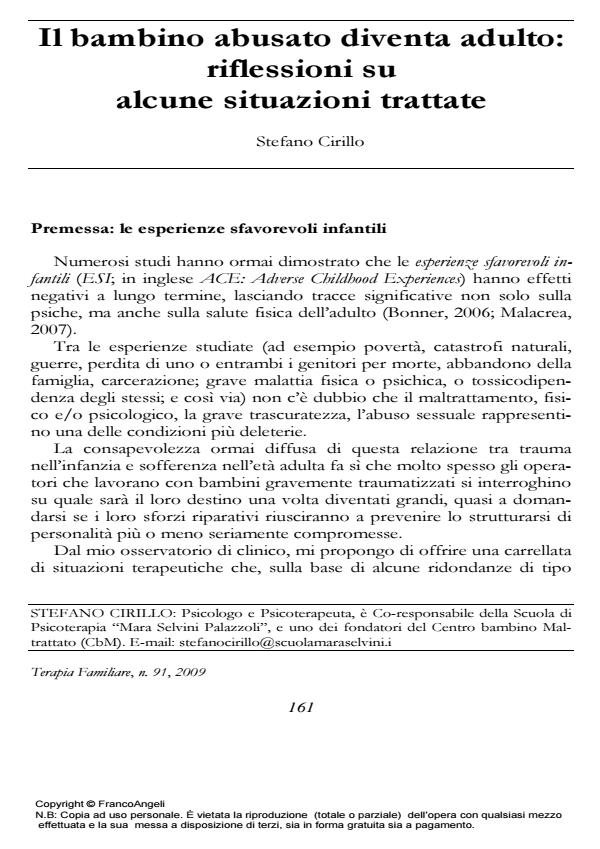Il bambino abusato diventa adulto: riflessioni su alcune situazioni trattate
Journal title TERAPIA FAMILIARE
Author/s Stefano Cirillo
Publishing Year 2009 Issue 2009/91
Language Italian Pages 22 P. 161-182 File size 1390 KB
DOI 10.3280/TF2009-091010
DOI is like a bar code for intellectual property: to have more infomation
click here
Below, you can see the article first page
If you want to buy this article in PDF format, you can do it, following the instructions to buy download credits

FrancoAngeli is member of Publishers International Linking Association, Inc (PILA), a not-for-profit association which run the CrossRef service enabling links to and from online scholarly content.
Il bambino abusato diventa adulto: riflessioni su alcune situazioni trattate - The author analyses some clinical cases in order to reflect upon the varying consequences of child sexual abuse on the development of abused males. Three distinct cases observed in clinical population are discussed. The typical victim’s transformation into offender, the persistent tendency in victims to perpetuate the role of victim and the persistent tendency in the brothers’ female victims to perpetuate the role of the spectator. The attachment system (provided both by the protective parent and by the abusing parent) plays a key role in the abused child’s development related to the dimension of fear produced by the traumatic event.
Keywords: sexual abuse, consequences of abuse, male victims, repetition of violence, inhibition of aggressiveness, consequences of victims’ brothers.
- Riflessioni sull'abuso sessuale da parte delle madri. Rivelazioni, trauma e trattamento dei bambini abusati dalle donne Annalisa Di Luca, Rosetta Cappelluccio, in MALTRATTAMENTO E ABUSO ALL'INFANZIA 3/2021 pp.115
DOI: 10.3280/MAL2021-003006 - Violenza coniugale e violenza assistita: un approccio familiareindividuale Stefano Cirillo, in TERAPIA FAMILIARE 135/2024 pp.19
DOI: 10.3280/TF2024-135002 - Autonomia e dipendenza: due termini che si oppongono? Stefano Cirillo, in TERAPIA FAMILIARE 102/2013 pp.15
DOI: 10.3280/TF2013-102002
Stefano Cirillo, Il bambino abusato diventa adulto: riflessioni su alcune situazioni trattate in "TERAPIA FAMILIARE" 91/2009, pp 161-182, DOI: 10.3280/TF2009-091010